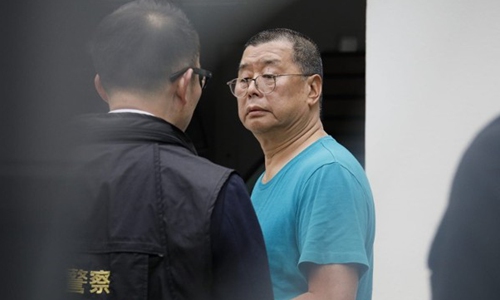HOME >> OPINION
Arresting and prosecuting Jimmy Lai demonstrates HK’s rule of law
By Tian Feilong Source:Global Times Published: 2020/2/29 14:38:40 Last Updated: 2020/2/29 17:20:56

Photo via on.cc
Jimmy Lai Chee-ying, a well-known and veteran "political media person," is a unique ghost-like existence in Hong Kong's diverse political ecosystem. His NEXT Digital, and Apple Daily in particular, is characterized by slanders and attacks on the governance of the Hong Kong Special Administrative Region (SAR) government and China's overall political system. Lai has played complicated and multiple roles as "fundraiser," "propagandist," and "behind-the-scenes master" during Hong Kong's radical social movements.If his acts were carried out within the scope of the law, perhaps he could be defended as exercising the right to freedom of speech and freedom of political participation. However, Lai's many actions have crossed legal boundaries, endangered the rule of law and challenged the "one country, two systems" principle. Voices demanding Lai be prosecuted and punished in accordance with law have long existed, and the Hong Kong police and the SAR government are believed to have had some strong evidence to punish him legally.
Lai was arrested on Friday morning for intimidation and illegal assembly. The actions against him were carried out in accordance with law and within the degree of autonomy that Hong Kong has. He was released on bail at noon but will appear in court on May 5.
In Hong Kong, there are a certain number of people who abuse the political freedom that the "one country, two systems" principle and the Basic Law to engage in subversive activities. Article 23 of the Hong Kong Basic Law provides that the Hong Kong Special Administrative Region "shall enact laws on its own to prohibit any act of treason, secession, sedition, subversion against the Central People's Government, or theft of state secrets, to prohibit foreign political organizations or bodies from conducting political activities in the region, and to prohibit political organizations or bodies of the region from establishing ties with foreign political organizations or bodies." Lai accepted foreign aid to incite radical social movements in Hong Kong and subvert the Basic Law. However, he has been at large due to the absence of Article 23 legislation and judicial omission.
Nonetheless, there are other charges that can be used to punish Lai for acts that endanger the city. As the violent protest against the extradition bill in Hong Kong last year has seriously damaged the rule of law, the Hong Kong police, the Department of Justice and courts have reached a growing consensus that legal actions must be taken to maintain Hong Kong's rule of law, restore social order and reshape the authority of constitutional order.
Prosecuting Lai is within Hong Kong's high degree of autonomy and the central government won't intervene. But the central government should support and supervise the SAR government and relevant authorities to carry out their duties in accordance with law. However, unfortunately, as the political ecology in Hong Kong seriously deteriorates, any legal action would be overly politicalized and criticized as long as it involves opposition figures. This time is no exception. Some local and Western media outlets call the arrest of Lai "blatant acts of political suppression," and even called on the US to intervene and impose sanctions. They might think the US could use its Hong Kong Human Rights and Democracy Act that came into force on November 21, 2019 to protect "dissidents" and sanction relevant Hong Kong law-enforcement officers.
However, their appeal has no legal basis and is unfeasible. First of all, the US bill is illegal and it's a long-arm jurisdiction over Hong Kong's autonomy. Second, China and the US have signed the phase one trade deal, and the role of Hong Kong as a bargaining chip has declined. It's not in line with US interests to sacrifice political capital to interfere in Lai's case. Third, Lai case is an ordinary criminal case, and is in the process of investigation. Hong Kong has sufficient procedures to protect the suspect under the rule of law and Lai can also hire top lawyers to defend him.
The SAR government and Hong Kong society are reaching consensus to rebuild the economy and people's livelihood, bridge the divisions within the society, assist young people in development and take effective prevention and control measures to deal with the COVID-19. But radical opposition including Lai are still seeking opportunities to undermine the city's rule of law. Therefore, the SAR government needs to focus on both the livelihood and rule of law so as to get Hong Kong back on the track of order, stability and prosperity. HongKongers' wish to return to a stable life and the rule of law cannot be trampled upon. No one can enjoy privileges beyond the law. Lai must be punished in accordance with the law to prove the rule of law of Hong Kong.
The author is associate professor at Beihang University in Beijing and member of Beijing-based Chinese Association of Hong Kong and Macao Studies. opinion@globaltimes.com.cn
RELATED ARTICLES:
Posted in: VIEWPOINT